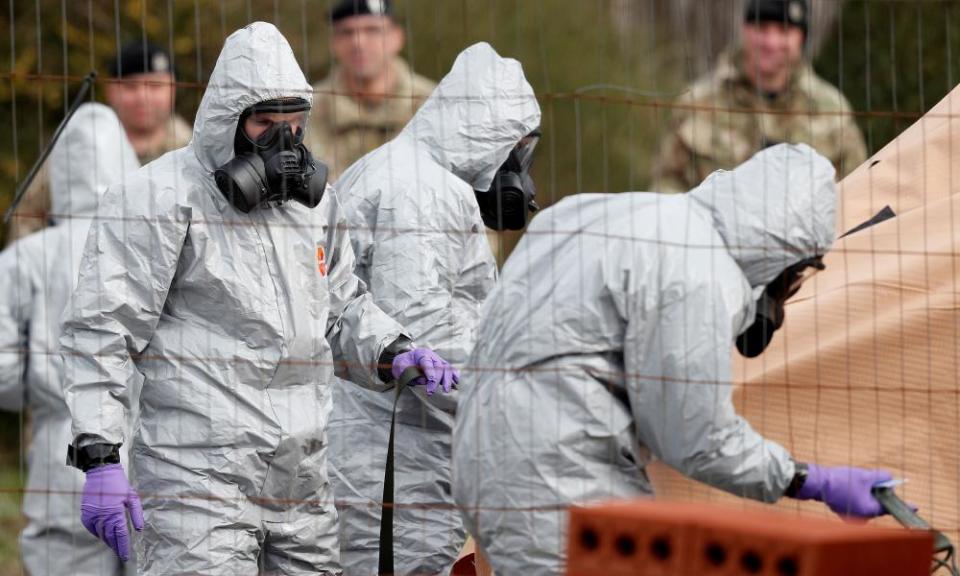Who to believe on UK spy attack: official condemnation or Trump's equivocation?
The nerve agent attack in Salisbury has highlighted the president’s tendency to adopt a tone strikingly at odds with US government policy

The US envoy to the United Nations, Nikki Haley, delivered a powerful speech at the UN on Wednesday in support of the UK in its showdown with Russia over the nerve agent attack on the former spy Sergei Skripal.
The question facing London, however, is whether she really spoke for her country.
Haley’s clear statement that the “US believes that Russia is responsible for the attack” was striking in part because of the difference in tone from Donald Trump’s own remarks on the issue.
The US president has not so far used Twitter – by far his preferred tool of communication – to pass judgment on the incident, in marked contrast to his fast responses to earlier attacks in the UK linked to Islamic extremism. Those gut responses were so hasty they earned a rebuke from Theresa May.
Trump has been relatively taciturn on the Salisbury attack, in line with his consistent reluctance throughout his campaign and presidency to cast blame on Vladimir Putin or the Kremlin. As has frequently been the case, criticism has come from official statements and from other members of the administration, but not from the president’s mouth or Twitter feed.
The Salisbury nerve agent attack, which Theresa May called an “unlawful use of force by the Russian state” against a Nato ally, has brought that longstanding dissonance into sharp focus.
The White House press secretary, Sarah Sanders, ducked questions on Monday about whether the US agreed with the UK assessment that Russia was behind the attack. By Wednesday night she had issued a statement that said the US stood in solidarity with its closest ally, the United Kingdom, and “shares the assessment that Russia is responsible for the reckless nerve agent attack”, calling the decision to expel Russian diplomats a just response.
“This latest action by Russia fits into a pattern of behavior in which Russia disregards the international rules-based order, undermines the sovereignty and security of countries worldwide, and attempts to subvert and discredit western democratic institutions and processes,” Sanders’ statement said.
Trump himself has been low key on the matter. Questioned about the Salisbury poisoning on Tuesday, he equivocated.
“It sounds to me like they believe it was Russia and I would certainly take that finding as fact,” he said at first, but he quickly introduced an element of doubt.
“We’re speaking with Theresa May today and, as soon as we get the facts straight, if we agree with them, we will condemn Russia or whoever it may be,” the president told reporters.
On Wednesday night the White House put out its clearest statement to date, in line with Haley’s remarks.
“The United States stands in solidarity with its closest ally, the United Kingdom,” the statement said, adding that the US “shares the UK’s assessment that Russia is responsible for the reckless nerve attack on a British citizen and his daughter, and we support the UK’s decision to expel Russian diplomats as a just response”.
But Trump himself said and tweeted nothing about the call, nor about May’s announcement of retaliatory measures against Moscow.
His tweets on Wednesday were about the business climate, infrastructure and international trade relations.
Thomas Wright, the director of the centre on the US and Europe at the Brookings Institution thinktank, said: “There are two national security strategies operating in parallel: the official one that the cabinet supports and is largely in the official documents is an internationalist, pro-alliance strategy, and Haley is very much a part of that.
“The second is the ‘America first’ strategy, that Trump champions, which is much more nationalistic, pro-Russian and hostile generally to alliances,” Wright added.
“They have very little to do with each other. Haley’s comments just show that continues to be the case, because it’s a completely different tone and substance than what Trump has said this week, which has been much more conditional and hesitant.”
Some critics of the president argue that the huge national security risk of the nerve agent attack will make it hard for Trump to take shelter behind ambiguity.
Nicholas Burns, who was ambassador to Nato and under secretary of state for political affairs in the Bush administration, said the UK attack was “Judgment day for Donald Trump”.
“Will he support Britain unequivocally on the nerve agent attack?” Burns asked in a tweet. “Back Nato sanctions? Finally criticize Putin? Act like a leader of the West?”
Donald Tusk, the president of the European Council, tweeted: “For real friends, this should be obvious: At a time of fake news spreading, meddling in our elections, and attacks on people on our soil with nerve agent, the response must not be transatlantic bickering but transatlantic unity.”
Rex Tillerson’s last major act as secretary of state was to issue a tough statement on Monday, quite at odds with White House hesitancy, saying the attack “clearly came from Russia”. He was fired hours later, but the real reasons for the dismissal and its timing remain unclear.
Wright, the author of a recent book on geopolitics, All Measures Short of War: The Contest for the 21st Century and the Future of American Power, said that Trump was now trying to eliminate some of the ambiguities in the administration’s foreign policy, in line with his gut instincts.
“This is the defining moment for the administration,” he said. “He now wants to impose his will on it, and replace ‘the adults in the room’ with people he thinks will be more loyalist.”
